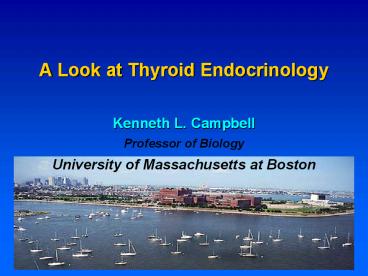Thyroid Functions - PowerPoint PPT Presentation
Title:
Thyroid Functions
Description:
Title: No Slide Title Author: Kenneth L. Campbell Last modified by: Kenneth L Campbell Created Date: 4/6/2004 1:30:27 AM Document presentation format – PowerPoint PPT presentation
Number of Views:138
Avg rating:3.0/5.0
Title: Thyroid Functions
1
(No Transcript)
2
Thyroid Functions
- Supports growth development, especially in the
embryo brain - Helps regulate internal thermostasis,
particularly in the young - Helps maintain metabolic energy balance
increases number size of mitochondria,
increases enzymes in the electron transport
chain, increases Na/K ATPase activity - Generally excitatory for normal cellular
functions including heart muscle
3
Thyroid Health Problems
Hypothyroidism (4.1F, 0.6M/1000/y) Iodine
deficiency disorders (2x108 cases, 109 at risk
most common thyroid endocrine
illnesses) endemic goiter endemic
cretinism Hashimotos thyroiditis (3.5F,
0.8M/1000/y) Hyperthyroidism (0.8F,lt0.1M/1000/y)
Graves disease (autoimmune thyrotoxicosis)
(0.8F, 0.1M/1000/y, prevalence of diabetes
mellitus) Thyrotoxicosis of pregnancy (5-10
postpartun) Toxic multinodular goiter Thyroid
neoplasia (most common endocrine
neoplasms) Benign enlargement Malignancies
4
Thyroid Anatomy
5
Thyroid Axis
6
http//www.addison.ac.uk/endocrine_modules/module1
/lecturers_material/html_files/END1.08/index.htm
7
(No Transcript)
8
(No Transcript)
9
Thyroid Hormone Transport Proteins
MW kD Plasma uM T4 cap. ug T4/dL Ka T4 L/M Ka T3 L/M Usual Occ. by T4 Turnover Rate /d TT4 Bd TT3 Bd
TBG 54 0.27 21 1x1010 5x108 31 13 68 80
TTR 54 4.6 350 7x107 1.4x107 2 59 11 9
Alb 66 640 50K 7x105 1x105 lt0.1 5 20 11
Free 0.02 0.3
After Larsen et al., Thyroid physiology and
diagnostic evaluation of patients with thyroid
disorders, Ch. 10, Larsen, Kronenberg, Melmed,
Polonsky (eds) Williams Textbook of
Endocrinology, 10th ed., W.B. Saunders Co.
Philadelphia, PA, 2003, 338, Table 10-3.
10
Substrate Km T4 T3 rT3 D 1 - 5
5 10-6 10-3 D 2 - 5 only 10-9 10-9 D 3 - 5
only 10-9 10-9
Thyroxine Catabolism
11
Direct Links to Other Endocrine Axes
TRH Somatostatin also help control PRL GH
12
Indirect Links to Other Systems
Glucocorticoid Excess ? ? TSH, TBG, TTR, T3, T4,
?rT3 Deficiency ? ? TSH Estrogens ? TBG
sialylation serum t1/2 ? T4 requirement in
hypothyroidism ? TSH in postmenopausal
women Androgens ? TBG ? T4 turnover in women ?
T4 requirement in hypothyroidism
13
Mechanism of T3
4 functional intra-nuclear T3 receptors a1,
ß1,2,3 1 non-functional receptor, a2.
Expression varies with tissue developmental
stage.
http//www.addison.ac.uk/endocrine_modules/module1
/lecturers_material/html_files/END1.08/index.htm
14
Pregnancy the Thyroid Axis
15
A population study of the thyroid axis arose
during examination of the physiological
determinants of fertility level in a
non-Westernized population.
16
Where were the Gainj?
17
(No Transcript)
18
(No Transcript)
19
Physiology demography were synergistic in
explaining fertility.
20
Female PRL made us question impacts on thyroid
function.
But no goiter?
21
Prolonged intensive nursing keeps prolactin high
ovulation suppressed.
22
PRL decreased during lactation, but was still
clinically high implying TRH might be high, TSH
should be high, T4 should be high unless iodine
deficiency was present. Thyroid axis pathology
might help explain low fertility. Was there
evidence for any?
23
Classic Highlands goiter, a clear sign of endemic
iodine - deficiency hypothyroidism, was absent.
http//www.j3s.net/photolog/ghana/
t.20030909_goiter.jpg
24
There were, however, at least two cretins in the
Gainj community.
25
Thyroid Axis Parameters
26
Hormone levels looked pretty normal (euthyroid).
What about carrier protein levels, albumin,
prealbumin ( transthyretin), or TBG?
27
(No Transcript)
28
Given the protein levels, how does T4/T3
distribute across TBG,TTR, Alb?
29
While Alb TTR are low, particularly in women,
high TBG levels might also indicate a low-binding
genetic variant.
30
Biochemical characteristics of Gainj TBG DNA
sequencing of several samples by Refetoff et al.
in Chicago implies Gainj TBG is a wild type.
31
The data imply the Gainj are euthyroid with high
TBG compensating for low Alb TTR, probably
prolonging T4 circulation time, decreasing
clearance decreasing the iodine requirement.
Unmet elevated demands during pregnancy
lactation may result in fetal hypothyroidism
cretinism, in more marginal thyroid status for
women, in overall depression of population
fertility.
32
There is an important interplay of environmental
dietary controls on the thyroid axis its
functions as well as impact of sex steroids.
Exploring this network requires evaluation of all
the hormones binding proteins involved.
33
Work on the Gainj has implications for public
health control of endemic iodine deficiency to
avoid hyperthyroid rebound while supplementing
dietary iodine, you must also supplement protein
intake to allow binding globulins to readjust.
34
Support from NSF, Umass/Boston, Sandia National
Labs, Hybritech, Quidel, Monoclonal Antibodies
Inc.
(in the lab at UMB)































